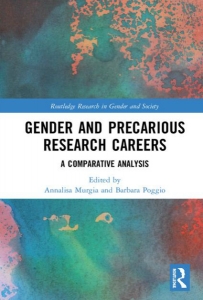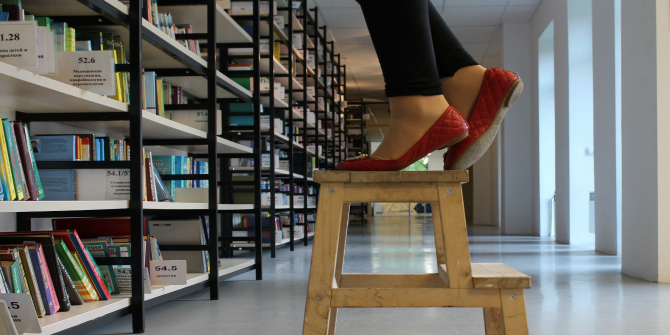In Gender and Precarious Research Careers: A Comparative Analysis – available to download here open access – editors Annalisa Murgia and Barbara Poggio bring together contributors to offer an essential interrogation of the neoliberal restructuring of universities and the particular impact this has on women in the early stages of their research careers. This is a powerful account of the ways in which gender and precarity are intertwined in the academy, writes Amelia Morris.
Gender and Precarious Research Careers: A Comparative Analysis. Annalisa Murgia and Barbara Poggio (eds). Routledge. 2019.
 Find this book (affiliate link):
Find this book (affiliate link): ![]()
It is no secret that academia has undergone a shift towards market-driven targets, leading universities to prioritise ‘dimensions such as performativity, competitiveness, project based working and commodification’ (4). In the UK, for example, universities have been heavily criticised for their use of zero-hours contracts and temp agencies. These conditions create the foundations for a culture of overwork, which has been cited as contributing to declining mental health in the academy, and even to the death of some academics.
The edited collection Gender and Precarious Research Careers – available to download here open access – provides an essential interrogation into the aforementioned neoliberal restructuring of universities and the particular impact of this on women in the early stages of their research careers. By bringing together the voices of academics from across several European universities in countries such as Iceland, Italy, Slovenia and Austria, it offers a powerful account of the ways in which gender and precarious working conditions are intertwined in the academy. Yet, situating the book within the context of the 2008 economic crash and the neoliberal agenda that followed, the project differs from work on the ‘leaky pipeline’ phenomenon, which focuses on women and men working in academia (Alper and Gibbons 1993). Rather, the book lays out the overlooked experiences of postdocs and temporary researchers who ‘chose’ to leave academia and/or were forced out (4). The choice of case studies of scholars from STEM and SSH fields means that the book offers an analysis of the way that gender operates across disciplines, equipping the project with an original lens that is relevant to academics from a range of subjects.
The topics that are covered in this book include, but are not limited to, gender practices in the everyday formation of academia; the gendered precariousness of academic careers; the structuring of academic labour markets; how neoliberal managerialism affects budgets; and the gendered construction of excellence for Early Career Researchers (ECRs) in STEM and SSH institutes.
Image Credit: (Pixabay CC0)
Chapter Three, ‘Gender budgeting to expose inequalities in a precarious academia – and redistribute resources to effect change’, explores how university budgeting acts as an insight into the entrenched gender norms within academic institutions. In an effort to ‘follow the money’ (84), Finnborg S. Steinþórsdóttir et al make sense of how new managerial decisions impact ECRs via ‘gender budgeting’. This latter term acts as a theoretical and methodological lens for understanding which practices/systems are valued, and what this can tell us about gender. For instance, the chapter highlights how precarious work is more often occupied by women than by men, such as the role of the adjunct and/or sessional teacher. Another important point raised by the authors in this chapter is the way in which the pressure to produce ‘scientific excellence’ is deeply wrapped up with gendered understandings of ‘good’ research/teaching. At the University of Iceland, if academics want to ‘progress up the ladder’, they need to receive a certain number of points. If they unable to attain these points, they will lose their position at the University. Yet, the analysis demonstrates that it is more ‘beneficial for academics working in male dominated fields than feminised fields’, and that the process for ranking research comes from a STEM-focused understanding of methodology.
In Chapter Five, Sanja Cukut Krilić et al bring attention to gendered discussions surrounding work-life balance in academia. Whilst the increase in labour force participation by women in academia has challenged the ‘male breadwinner/female caregiver model of work-family relations’ (145), there are still powerful gender norms that structure the division of labour within academia. This has led to narratives questioning women’s ability to ‘have it all’, meaning that work-life balance policies ‘do not automatically improve or hinder work-life balance experiences’ (171). Rather, the chapter highlights how the construction of the ‘ideal’ academic (all-consumed by work and ‘happy’ this way) cuts across experiences despite gender and caregiving roles, particularly amongst scholars in the early stages of their career.
One particular triumph of this chapter is its use of interviews, which bring real colour to the analysis, and truly reflect the ubiquitous sense of anxiety experienced by academics. When discussing the ways in which some supervisors ‘ignore’ motherhood, the authors quote the following from a participant:
During my pregnancy I […] had a lot of workload and was not coping, and I kind of broke down and I was saying that I was having too much work and it was not taken seriously [by the supervisor] (IS, STEM, F, assistant professor]
Here, the authors note how this leads to a ‘culture of silence’ surrounding motherhood, in which female academics are made to feel like parenting is secondary to the academy. The aforementioned quote really brings to light the ways in which neoliberal understandings of the ‘perfect’ scholar play out in the experiences of women, and how these are deeply wrapped up with masculine notions of competition, wherein caring is considered a ‘choice’.
One of the main areas of innovation in this book is reflected by the fact that the research was used to create and implement ‘self-tailored gender action plans’ (5) in all the universities which carried out the project. Indeed, this desire for real impact in institutions is at the heart of the book, and contributes to the project’s sense of urgency. This leads to the book’s biggest strength: it attempts to include all the members of the project in ‘the research part, as well as in the publishing stage and the presentation of the findings’ so that ‘everyone’s work would be visible’. Such a reflexive approach is essential to a project focused on interrogating the precarious situation of ECRs. Moreover, the proactive approach of the authors demonstrates the need to get beyond discussions of precarity in a theoretical sense. In simple terms, this book ‘talks the talk’ but also ‘walks the walk’ by creating space for ECRs to develop their academic profiles.
Overall, this book is a timely and important contribution to scholarship on gender within the neoliberal academy. It succeeds in demonstrating how gender and the neoliberal university are intertwined, and reflects the ways in which this impacts women in academia. As a young woman who recently took a break from academia, this book felt cathartic to read, and I saw many of my own experiences laid out in the case studies. Indeed, I am confident that the majority of women who are in or who have left academia would feel the same, and I would go as far to argue that this book should be required reading for any academic in the STEM and SSH fields.
Note: This review gives the views of the author, and not the position of the LSE Review of Books blog, or of the London School of Economics and Political Science. The LSE RB blog may receive a small commission if you choose to make a purchase through the above Amazon affiliate link. This is entirely independent of the coverage of the book on LSE Review of Books.








